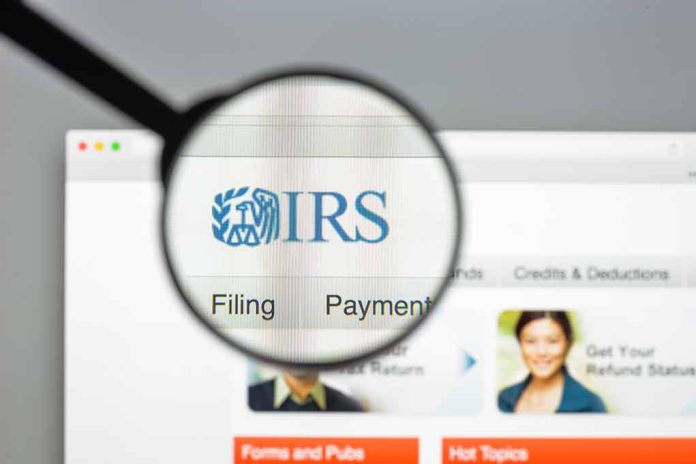
In a decisive ruling that strengthens the IRS’s position in bankruptcy proceedings, the Supreme Court has determined that the tax agency cannot be forced to return potentially fraudulent payments due to sovereign immunity protections.
Key Takeaways
- The Supreme Court ruled 8-1 in favor of the IRS, reinforcing that federal sovereign immunity shields the agency from certain bankruptcy clawback attempts.
- The case centered on a $145,000 payment made to the IRS by All Resort Group Inc. three years before bankruptcy, which lower courts had deemed fraudulent under state law.
- Justice Ketanji Brown Jackson wrote for the majority, emphasizing that sovereign immunity waivers are jurisdictional and do not create new substantive rights against the government.
- This ruling prevents bankruptcy trustees from using state fraudulent transfer laws to recover payments made to the IRS beyond the typical two-year lookback period.
- Justice Neil Gorsuch provided the lone dissent, breaking with the majority interpretation of sovereign immunity in this bankruptcy context.
Supreme Court Reinforces IRS Sovereign Immunity in Bankruptcy Proceedings
The U.S. Supreme Court delivered a significant victory for the Internal Revenue Service in United States v. Miller, ruling 8-1 that the agency’s sovereign immunity protects it from certain bankruptcy clawback attempts. The decision clarifies that bankruptcy trustees cannot recover potentially fraudulent transfers made to the IRS beyond the standard two-year lookback period by using state law provisions. This ruling overturns a previous decision by the 10th Circuit Court and resolves a split among federal appeals courts on this matter.
🚨 SCOTUS Just Gave the IRS a Free Pass to Keep Stolen Money~Even if It Came from You 🚨
The Supreme Court just ruled on 26 March, 2025~8-1 in United States v. Miller that if someone steals money from you or your business and uses it to pay their IRS tax debt, the IRS gets to… pic.twitter.com/D6Wg5HxtfI
— 💅🏻💋qubit💋💅🏻#FlynnFramedTrump‼️ (@qubitTwit) March 27, 2025
At the center of the case was All Resort Group Inc., a Utah company that transferred $145,000 to the IRS to settle its principals’ tax debts three years before filing for bankruptcy. When the bankruptcy trustee attempted to recover these funds, arguing they constituted a fraudulent transfer under Utah state law, the government defended itself by invoking sovereign immunity. While lower courts sided with the trustee, the Supreme Court has now firmly established that federal sovereign immunity shields the IRS in these circumstances.
Legal Implications of the Court’s Ruling
Writing for the majority, Justice Ketanji Brown Jackson emphasized the fundamental nature of sovereign immunity in American jurisprudence. The Court determined that while Section 106(a) of the Bankruptcy Code does waive sovereign immunity for certain bankruptcy claims, this waiver does not extend to the state law claims that might be nested within a federal bankruptcy claim. This distinction proved crucial in the Court’s analysis, as it prevents trustees from using state laws to circumvent federal protections. “Waivers of sovereign immunity are jurisdictional provisions that empower courts to hear claims against the government but do not themselves typically create any new substantive rights against the government,” wrote Justice Ketanji Brown Jackson in her majority opinion.
The Court’s decision turns on a detailed analysis of Bankruptcy Code Section 544(b), which allows trustees to avoid transfers that an actual creditor could avoid under applicable law. However, the majority determined that this provision requires the existence of a creditor who could genuinely bring a successful claim against the government under state law – which sovereign immunity would typically prevent. The ruling emphasizes that courts must interpret sovereign immunity waivers narrowly, resolving any ambiguities in favor of the sovereign.
Practical Impact for Bankruptcy Cases
For bankruptcy professionals and creditors, this ruling represents a significant limitation on the tools available to recover assets paid to government entities. Specifically, the decision prevents extending the lookback period beyond two years when the recipient is a government agency protected by sovereign immunity. Bankruptcy trustees will now need to rely solely on the provisions explicitly available in the Bankruptcy Code rather than incorporating state fraudulent transfer laws to pursue older transactions.
Legal experts note that while this case may appear technical, its implications are far-reaching. Jack Williams, a bankruptcy law professor quoted in Bloomberg Law, observed that “This case is big in small ways.” The ruling could particularly impact single-asset bankruptcy cases and may prompt trustees to explore alternative recovery methods. Some bankruptcy professionals suggest that Section 550 of the Bankruptcy Code might still offer a path for recovery in certain circumstances, as it contains its own waiver of sovereign immunity.
Sources:
Supreme Court Hands IRS Win Over Bankruptcy Trustee Clawback (3)
Supreme Court Reverses Bankruptcy Tax Clawback Decision
SCOTUS Sides With IRS In Bankruptcy Dispute



